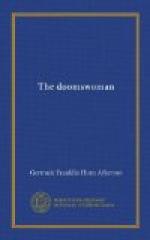“And yet thou wouldst not help her brother?”
“Her brother is less to me than any man with whom I have sat to-night. Build no hopes on that. You will stay at Santa Barbara and play the grand seigneur, which suits you very well, or become a prisoner in your own house.” And he left the room.
XXXI.
An hour later they assembled in the plaza to start for the bear hunt. Reinaldo was not of the party.
Estenega lifted Chonita to her horse and stood beside her for a moment while the others mounted. He touched her hand with his:
“We could not have a more beautiful night,” he said, significantly. “And I have often wished that my father had included this spot when he applied for his grant. I should like to live with you here. Even when the winds rage and hurl the rain through the very window pane, I know of no more enchanting spot than Fort Ross. The Russians are going; some day I will buy it for you.”
She made no reply, but she did not withdraw her hand, and he held it closely and glanced slowly about him. Always, despite his bitter intimacy with life, in kinship with nature, perhaps in that moment it had a deeper meaning, for he saw with double vision: She was there; and, with him, sensible not only of the beauty of the night, but of the indefinable mystery which broods over California the moment the sun falls. Perhaps, too, he was troubled by a vague foreboding, such as comes to mortals sometimes in spite of their limitations: he never saw Fort Ross again.
On the horizon the fog crouched and moved; marched like a battalion of ocean’s ghosts; suddenly cohered and sent out light puffs of smoke, as from the crater of a spectral volcano. The moon, full and bright and cold, hung low in the dark sky: one hardly noted the stars. The vast sweep of water was as calm as a lake, dark and metallic like the sky, barely reflecting the silver light between. But although calm it was not quiet. It greeted the forbidding rocks beyond the shore, the long irregular line of stark, storm-beaten cliffs, with ominous mutter, now and again throwing a cloud of spray high in the air, as if in derisive proof that even in sleep it was sensible of its power. Occasionally it moaned, as if sounding a dirge along the mass of stones which storms had hurled or waves had wrenched from the crags above,—a dirge for beheaded Russians, for him who had walked the plank, or for the lover of Natalie Ivanhoff.
Here and there the cliffs were intersected by deep straggling gulches, out of whose sides grew low woods of brush; but the three tables rising successively from the ocean to the forest on the mountain, were almost bare. On the highest, between two gulches, on a knoll so bare and black and isolated that its destiny was surely taken into account at creation, was a tall rude cross and a half hundred neglected graves. The forest seemed blacker just behind it, the shadows thicker in the gorges that embraced it, the ocean grayer and more illimitable before it. “Natalie Ivanhoff is there in her copper coffin,” said Estenega, “forgotten already.”




